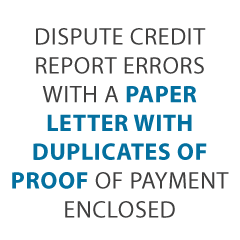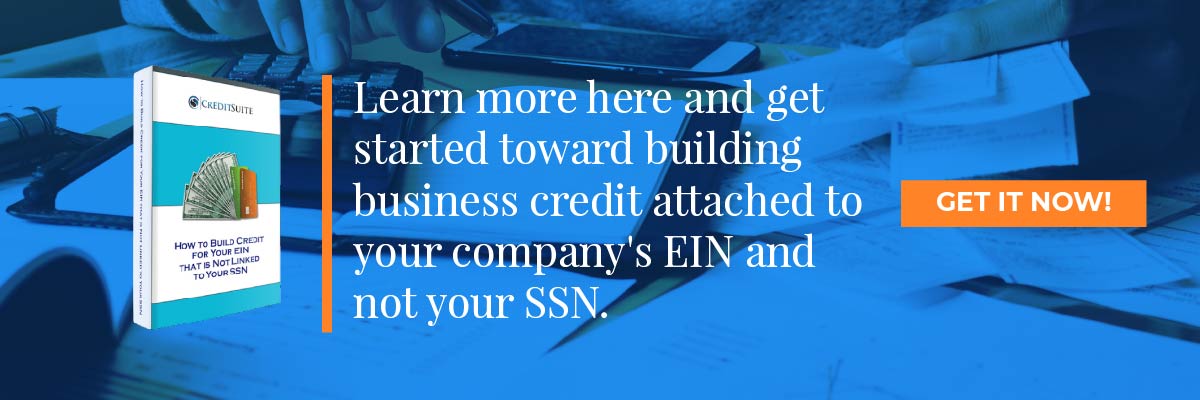- Connect With Us!
- (877) 600-2487
- info@creditsuite.com
3 Simple Methods to Raise Your Free Business Credit Score
Published By Janet Gershen-Siegel at October 2nd, 2017
It’s Time to Raise Your Free Business Credit Score
Your mission, should you choose to accept it, is to improve your free business credit score. Improving your business credit scores will make it easier for you to get loans and credit, and you will get better terms for both.
It can also mean the difference between wanting business credit and loans, and not getting them at all. So here are three simple methods to improve your business credit scores.
So here’s how.
Establish Your Free Business Credit Score
Company credit is credit in a company’s name. It doesn’t connect to an entrepreneur’s consumer credit, not even if the owner is a sole proprietor and the only employee of the business.
As such, an entrepreneur’s business and consumer credit scores can be very different.
The Benefits of Improving Your Free Business Credit Score
Since business credit is distinct from individual, it helps to safeguard an entrepreneur’s personal assets, in case of court action or business insolvency.
Also, with two distinct credit scores, a small business owner can get two different cards from the same merchant. This effectively doubles purchasing power.
Another benefit is that even startups can do this. Heading to a bank for a business loan can be a recipe for disappointment. But building company credit, when done right, is a plan for success.
Consumer credit scores rely on payments but also other elements like credit utilization percentages.
But for company credit, the scores actually just hinge on if a small business pays its invoices on a timely basis.
The Process of Raising Your Free Business Credit Score
Building business credit is a process, and it does not happen without effort. A company will need to actively work to build small business credit.
That being said, it can be done easily and quickly, and it is much more rapid than developing personal credit scores.
Vendors are a big part of this process.
Carrying out the steps out of order will result in repetitive rejections. Nobody can start at the top with small business credit. For example, you can’t start with retail or cash credit from your bank. If you do, you’ll get a rejection 100% of the time.
Small Business Fundability
A business needs to be fundable to credit issuers and vendors.
Consequently, a company will need a professional-looking website and email address. And it needs to have website hosting from a merchant such as GoDaddy.
In addition, company phone and fax numbers must have a listing on ListYourself.net.
At the same time, the company telephone number should be toll-free (800 exchange or comparable).
A company will also need a bank account dedicated purely to it, and it has to have all of the licenses necessary for operating.
Licenses
These licenses all must be in the correct, accurate name of the small business. And they need to have the same business address and phone numbers.
So bear in mind, that this means not just state licenses, but possibly also city licenses.
Learn more here and get started toward growing your free business credit score.
Dealing with the Internal Revenue Service
Visit the IRS website and obtain an EIN for the small business. They’re free of charge. Choose a business entity like corporation, LLC, etc.
A company can get started as a sole proprietor. But they will more than likely want to change to a variety of corporation or an LLC.
This is in order to decrease risk. And it will make best use of tax benefits.
A business entity will matter when it involves taxes and liability in the event of litigation. A sole proprietorship means the business owner is it when it comes to liability and tax obligations. Nobody else is responsible.
Sole Proprietors Take Note
If you run a small business as a sole proprietor, then at least be sure to file for a DBA. This is ‘doing business as’ status.
If you do not, then your personal name is the same as the business name. As a result, you can wind up being directly liable for all business financial obligations.
And also, per the Internal Revenue Service, by having this arrangement there is a 1 in 7 chance of an IRS audit. There is a 1 in 50 probability for corporations! Prevent confusion and significantly lower the chances of an Internal Revenue Service audit at the same time.
Kicking Off the Business Credit Reporting Process
Start at the D&B website and get a free D-U-N-S number. A D-U-N-S number is how D&B gets a company into their system, to produce a PAYDEX score. If there is no D-U-N-S number, then there is no record and no PAYDEX score.
Once in D&B’s system, search Equifax and Experian’s websites for the business. You can do this at fastcs.wpengine.com/reports. If there is a record with them, check it for correctness and completeness. If there are no records with them, go to the next step in the process.
This way, Experian and Equifax will have activity to report on.
Vendor Credit Tier
First you need to establish trade lines that report. This is also known as the vendor credit tier. Then you’ll have an established credit profile, and you’ll get a business credit score.
And with an established business credit profile and score you can begin to obtain credit in the retail and cash credit tiers.
These kinds of accounts often tend to be for the things bought all the time, like marketing materials, shipping boxes, outdoor work wear, ink and toner, and office furniture.
But first off, what is trade credit? These trade lines are credit issuers who will give you preliminary credit when you have none now. Terms are commonly Net 30, versus revolving.
Hence, if you get approval for $1,000 in vendor credit and use all of it, you need to pay that money back in a set term, like within 30 days on a Net 30 account.
Details
Net 30 accounts must be paid in full within 30 days. 60 accounts must be paid fully within 60 days. Unlike with revolving accounts, you have a set time when you have to pay back what you borrowed or the credit you made use of.
To start your business credit profile the proper way, you need to get approval for vendor accounts that report to the business credit reporting agencies. As soon as that’s done, you can then make use of the credit.
Then repay what you used, and the account is on report to Dun & Bradstreet, Experian, or Equifax.
Vendor Credit Tier – It Helps
Not every vendor can help in the same way true starter credit can. These are merchants that will grant an approval with very little effort. You also want them to be reporting to one or more of the big three CRAs: Dun & Bradstreet, Equifax, and Experian.
You want 5 to 8 of these to move onto the next step, which is the retail credit tier. But you may have to apply more than one time to these vendors. So, this is to confirm you are responsible and will pay punctually. Here are some stellar choices from us: https://oldcs.creditsuite.com/blog/5-vendor-accounts-that-build-your-business-credit/
Retail Credit Tier
Once there are 5 to 8 or more vendor trade accounts reporting to at least one of the CRAs, then move onto the retail credit tier. These are companies like Office Depot and Staples.
Just use your Social Security Number and date of birth on these applications for verification purposes. For credit checks and guarantees, use the business’s EIN on these credit applications.
One good example is Lowe’s. They report to D&B, Equifax and Business Experian. They need to see a D-U-N-S and a PAYDEX score of 78 or higher.
Fleet Credit Tier
Are there 8 to 10 accounts reporting? Then progress to the fleet credit tier. These are service providers like BP and Conoco. Use this credit to buy fuel, and to repair, and maintain vehicles. Only use your SSN and date of birth on these applications for verification purposes. For credit checks and guarantees, make certain to apply using the company’s EIN.
One such example is Shell. They report to D&B and Business Experian. They need to see a PAYDEX Score of 78 or better and a 411 company phone listing.
Shell might say they want a specific amount of time in business or revenue. But if you already have enough vendor accounts, that won’t be necessary. And you can still get approval.
Learn more here and get started toward growing your free business credit score.
Cash Credit Tier
Have you been responsibly managing the credit you’ve up to this point? Then move onto the cash credit tier. These are businesses such as Visa and MasterCard. Just use your SSN and date of birth on these applications for verification purposes. For credit checks and guarantees, use your EIN instead.
One example is the Fuelman MasterCard. They report to D&B and Equifax Business. They need to see a PAYDEX Score of 78 or better. And they also want you to have 10 trade lines reporting on your D&B report.
Plus, they want to see a $10,000 high credit limit reporting on your D&B report (other account reporting).
In addition, they want you to have an established company.
These are businesses such as Walmart and Dell, and also Home Depot, BP, and Racetrac. These are often MasterCard credit cards. If you have 14 trade accounts reporting, then these are in reach.
Learn more here and get started toward growing your free business credit score.
Monitor Your Free Business Credit Score
Know what is happening with your credit. Make sure it is being reported and fix any inaccuracies ASAP. Get in the habit of taking a look at credit reports and digging into the specifics, and not just the scores.
We can help you monitor business credit at Experian and D&B for 90% less than it would cost you at the CRAs. See: fastcs.wpengine.com/monitoring.
At Equifax, you can monitor your account at: www.equifax.com/business/business-credit-monitor-small-business for about $19.99.
Update Your Record
Update the data if there are errors or the relevant information is incomplete. At D&B, you can do this at: https://iupdate.dnb.com/iUpdate/viewiUpdateHome.htm. For Experian, go here: www.experian.com/small-business/business-credit-information.jsp. So for Equifax, go here: www.equifax.com/business/small-business.
Fix Your Free Business Credit Score
So, what’s all this monitoring for? It’s to contest any mistakes in your records. Mistakes in your credit report(s) can be taken care of. But the CRAs typically want you to dispute in a particular way.
Get your company’s PAYDEX report at: www.dnb.com/about-us/our-data.html. Get your company’s Experian report at: www.businesscreditfacts.com/pdp.aspx?pg=SearchForm. And get your Equifax business credit report at: www.equifax.com/business/credit-information.
Disputes
Disputing credit report inaccuracies generally means you mail a paper letter with copies of any proof of payment with it. These are documents like receipts and cancelled checks. Never send the original copies. Always send copies and keep the original copies.
Fixing credit report errors also means you precisely itemize any charges you dispute. Make your dispute letter as understandable as possible. Be specific about the concerns with your report. Use certified mail so that you will have proof that you mailed in your dispute.
Dispute your or your business’s Equifax report by following the directions here: www.equifax.com/small-business-faqs/#Dispute-FAQs.
You can dispute mistakes on your or your business’s Experian report by following the directions here: www.experian.com/small-business/business-credit-information.jsp.
And D&B’s PAYDEX Customer Service phone number is here: www.dandb.com/glossary/paydex.
A Word About Your Free Business Credit Score
Always use credit smartly! Never borrow beyond what you can pay back. Keep an eye on balances and deadlines for repayments. Paying off on time and completely will do more to elevate business credit scores than just about anything else.
Growing small business credit pays off. Excellent business credit scores help a company get loans. Your lending institution knows the company can pay its debts. They recognize the company is authentic.
The business’s EIN connects to high scores and credit issuers won’t feel the need to request a personal guarantee.
Takeaway for How to Raise Your Free Business Credit Score
Business credit is an asset which can help your company in years to come. Learn more here and get started toward growing company credit.

 " class="attachment-blog-single size-blog-single wp-post-image" alt="Get Business Credit Cards for New Businesses Credit Suite-Business Line of Credit Decoded" title="Get Business Credit Cards for New Businesses">>
" class="attachment-blog-single size-blog-single wp-post-image" alt="Get Business Credit Cards for New Businesses Credit Suite-Business Line of Credit Decoded" title="Get Business Credit Cards for New Businesses">>